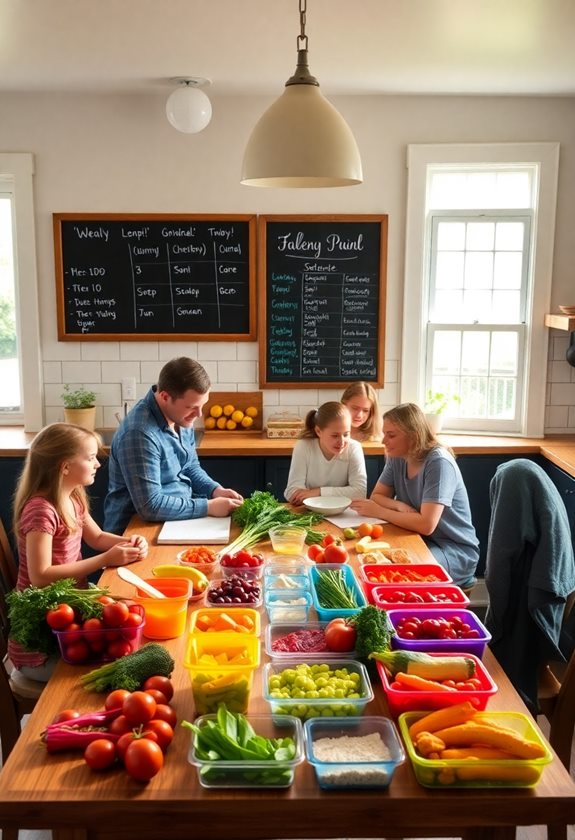Smart meal plans can make your family's eating experience both delicious and affordable! Start by tracking your food expenses to set a realistic budget. Do you have picky eaters at home? Consider their needs for meal planning. Stock up on pantry staples like grains, canned goods, and spices. Why not designate a planning day each week? It really helps! When possible, get creative with leftovers—turn roasted veggies into frittatas or enjoy stir-fries with leftover ingredients. There are tons of great recipes online, so you're not alone in this. Curious about more tips and tricks? You'll discover even more helpful ideas ahead! 😊🥦
Key Takeaways
- Track monthly food expenses to identify spending patterns and areas for cost-cutting in meal planning.
- Create a balanced meal list incorporating grains, proteins, and seasonal veggies to maximize nutrition and minimize costs.
- Utilize pantry staples and bulk purchases to prepare versatile meals that reduce waste and save money.
- Repurpose leftovers creatively, such as in frittatas or stir-fries, to enhance meal variety and decrease food waste.
- Use budgeting tools and meal planning apps to streamline grocery shopping and ensure adherence to your budget.
Understanding Your Budget

Understanding your budget is essential for creating smart meal plans that work for your family. Have you ever wondered how to stretch your food dollars? Start by tracking your monthly food expenses. Write down what you spend each week. This way, you can see where your money goes and find areas to cut back. Utilizing portion-controlled containers can also help you manage meal sizes and reduce food waste, leading to savings.
Next, set a realistic budget. How much can you afford to spend on groceries each week? Having a clear number helps you make better choices. You might even take into account using apps or budgeting tools to keep it simple.
Once you know your budget, reflect on your family's needs. Do you have picky eaters or food allergies to take into account? Knowing this can guide your meal planning and help you avoid unnecessary purchases.
When you prepare your meals, focus on buying in bulk and choosing seasonal produce. It not only saves money but also guarantees fresh ingredients for your meals.
Essential Pantry Staples
Stocking your pantry with the right staples can make meal planning more efficient and cost-effective. By incorporating comprehensive tracking of your pantry inventory, you can avoid unnecessary purchases and guarantee you always have what you need on hand. Have you ever opened your pantry and felt overwhelmed? By keeping essential items on hand, you can whip up meals in no time and save money.
Start with grains, like rice, pasta, and quinoa. These are versatile and filling! Next, don't forget about canned goods. Items like beans, tomatoes, and soups can be lifesavers when you're short on time. They're also affordable and last a long time.
You'll also want to include spices and herbs. They can transform a basic dish into something special. Ever tried adding a pinch of paprika or a sprinkle of oregano? It makes a world of difference!
Don't overlook oils and vinegars for cooking and dressing. A good olive oil or balsamic vinegar can elevate your meals. Finally, keep a stash of snacks like nuts and dried fruits. They're perfect for quick energy boosts.
Weekly Meal Planning Tips

When it comes to weekly meal planning, having a clear strategy can save you time and reduce stress. Start by picking a day to plan your meals. Sunday works for many, but find what fits your schedule. Do you enjoy cooking? Think about meals you love and can easily whip up during the week. Consider investing in durable meal prep containers that can help keep your ingredients organized and fresh.
Next, create a meal list. Aim for a mix of proteins, veggies, and grains. This way, you'll have balanced meals that your family will enjoy. Don't forget to include simple recipes! You can even ask your kids for their favorites. This makes them feel involved and excited about meals.
Once you've got your meal plan, make a shopping list. Stick to it to avoid unnecessary purchases. Isn't it great to save money while still eating delicious food? 🤩
Lastly, prep ingredients in advance. Chopping veggies or marinating proteins can save you time on busy nights. Remember, the goal is to keep things simple and enjoyable. With a little planning, you'll find that meal time can be fun, not stressful! So, what will be on your menu this week?
Creative Leftover Ideas
Transforming leftovers into exciting new dishes can be a game changer for your weekly meal routine. Have you ever looked at last night's dinner and thought, "What now?" Instead of letting those leftovers go to waste, why not get creative?
You can start by turning roasted veggies into a delicious frittata. Just mix them with eggs, pour it into a skillet, and bake until golden. It's a quick breakfast or lunch option that feels fresh! Or, how about using leftover chicken in a hearty soup? Just add broth, some noodles, and any veggies you have lying around.
Don't forget about stir-fries! Toss leftover meat and veggies in a pan with soy sauce and serve it over rice for a satisfying meal.
Feeling adventurous? Try making quesadillas! Just layer leftover meat, cheese, and any extras between tortillas, then grill until crispy.
With a little creativity, you can transform simple leftovers into exciting new dishes that your family will love. So, what's stopping you from giving your leftovers a second chance? 😊
Affordable Recipe Resources

Many families find themselves searching for affordable recipe resources that fit their budgets and busy lifestyles. Where do you start? One great option is online recipe websites. They offer countless recipes that cater to different dietary needs, all for free! Websites like AllRecipes and Budget Bytes are fantastic for finding meals that won't break the bank.
You can also explore social media platforms. Instagram and Pinterest are filled with budget-friendly meal ideas, and you can save them easily for later. Have you thought about joining cooking groups on Facebook? These communities often share their favorite budget recipes and tips.
Another helpful resource is local libraries. They have cookbooks focused on inexpensive meals, plus they host cooking classes sometimes! You might even discover a new favorite dish.
Don't forget about meal planning apps! They help you create shopping lists based on your chosen recipes, making it easier to stick to your budget.
Frequently Asked Questions
How Can I Involve Kids in Meal Planning?
To involve your kids in meal planning, ask for their favorite foods, let them choose recipes, and assign age-appropriate tasks like grocery shopping or prepping. It'll make meals more enjoyable and teach them valuable skills.
What Are Some Quick Meals for Busy Weeknights?
When time slips through your fingers like sand, quick meals become your lifeline. Try stir-fried veggies with pre-cooked chicken, tacos with canned beans, or one-pan pasta; these dishes turn chaos into comfort on busy weeknights.
How Do I Handle Food Allergies in Meal Planning?
When handling food allergies in meal planning, you should read labels carefully, substitute allergens with safe alternatives, and communicate clearly with family members. It's crucial to keep meals simple yet delicious while ensuring everyone's safety.
Which Kitchen Tools Save Time and Money?
To save time and money in the kitchen, invest in multi-functional tools like a pressure cooker, slow cooker, and sharp knives. They'll streamline your cooking process and help you minimize waste while maximizing flavor.
How Do I Store Leftovers Safely and Efficiently?
When you've got a little extra on your plate, don't let it go to waste. You can store leftovers in airtight containers, label them with dates, and keep them in the fridge or freezer for later enjoyment.

